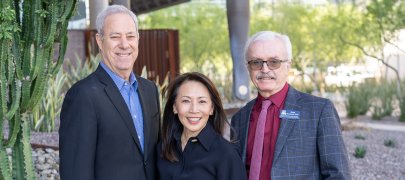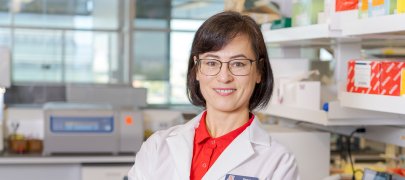Diversity Office Awards Grants
One faculty member and two students at the University of Arizona College of Medicine – Phoenix received grants for their work involving health disparities and improving diversity in the Phoenix community.
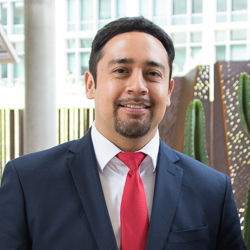
“Facilitating diversity of thought, perspective and content in research is something the Office of Diversity and Inclusion is committed to supporting. Our grant recipients help our college in its continued pursuit of inclusive excellence in health care,” Francisco Lucio, JD, associate dean of Diversity and Inclusion said.
First-year medical student Justin Zeien and second-year medical student Dylan Sabb both received $500 grants. Amy Ludwig, MEd, associate professor of the Doctoring Program, received $2,500 for her research.
Amy Ludwig
Ludwig plans to use the grant to create a formative learning experience for medical students. The goal is to recognize the adverse effects of bullying on the health of adolescents who identify as LGBTQ. It will be a two-part activity. The first will include students and members of the LGBTQ community; together they will collaborate on the design of the activity. The second part will involve a simulated encounter with a standardized patient and will implement decisions made in the first part.
“Increasing medical student knowledge on the effects of bullying on LGBTQ adolescents’ health is the primary goal,” Ludwig said. “However, it is my hope that the collaborative element of this project will strengthen the students’ commitment to fully invest in the activity.”
Ludwig said the funding will assist in the compensation of the students and community members who contribute to the activity, the standardized patients who will portray the patient and other miscellaneous administrative costs associated with the event.
Dylan Sabb
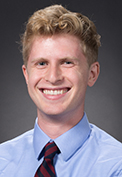 The goal of Sabb’s project is to improve cultural competence training at the college, particularly during pre-clerkship years. The funds will support student surveys, curricular module development and standardized patient encounters.
The goal of Sabb’s project is to improve cultural competence training at the college, particularly during pre-clerkship years. The funds will support student surveys, curricular module development and standardized patient encounters.
“This project aims to better prepare College of Medicine – Phoenix students to practice cultural humility and compassionate care as they enter their third-year rotations,” Sabb said. “Hopefully, the training will make our students better able to provide patient-centered care, which increases physician-patient rapport and supports a covenant relationship over the older paternalistic style of health care delivery.”
Sabb said the program depends on the combined efforts of several campus departments. Funding will permit standardized patient encounters, which will reinforce the curricular modules and offer a chance for practical experience.
Justin Zeien
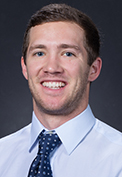 Zeien received funding to determine the current use of homeless services and the needs of the unsheltered homeless population in downtown Phoenix. His study will administer a needs assessment survey to better understand how to eliminate racial disparities in the homelessness rate and how to reduce Phoenix homelessness in general.
Zeien received funding to determine the current use of homeless services and the needs of the unsheltered homeless population in downtown Phoenix. His study will administer a needs assessment survey to better understand how to eliminate racial disparities in the homelessness rate and how to reduce Phoenix homelessness in general.
Students from the college may participate in the Street Medicine Phoenix (SMP) program, an initiative created by UA College of Public Health graduate student Jeffery Hanna and Zeien, by providing medical care to homeless individuals and linking these homeless individuals to community resources and a permanent medical home.
“Overall, the campus will help SMP promote health equity and equitable access to resources for all homeless individuals, particularly those that are racial minorities,” Zeien said.
The funding will enable distribution of care kits, which are a form of non-monetary compensation that homeless individuals will receive for completing the needs assessment. It contains basic life essentials.
Topics
About the College
Founded in 2007, the University of Arizona College of Medicine – Phoenix inspires and trains exemplary physicians, scientists and leaders to optimize health and health care in Arizona and beyond. By cultivating collaborative research locally and globally, the college accelerates discovery in a number of critical areas — including cancer, stroke, traumatic brain injury and cardiovascular disease. Championed as a student-centric campus, the college has graduated more than 800 physicians, all of whom received exceptional training from nine clinical partners and more than 2,700 diverse faculty members. As the anchor to the Phoenix Bioscience Core, which is projected to have an economic impact of $3.1 billion by 2025, the college prides itself on engaging with the community, fostering education, inclusion, access and advocacy.
